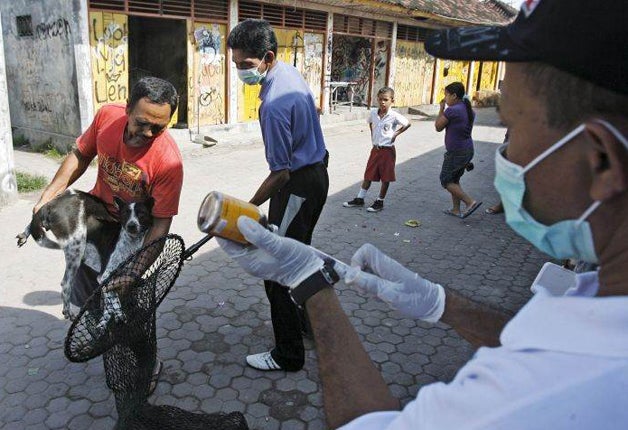Bali targets stray dogs as 65 people die from rabies
Authorities vow to control rapid spread of disease

Your support helps us to tell the story
From reproductive rights to climate change to Big Tech, The Independent is on the ground when the story is developing. Whether it's investigating the financials of Elon Musk's pro-Trump PAC or producing our latest documentary, 'The A Word', which shines a light on the American women fighting for reproductive rights, we know how important it is to parse out the facts from the messaging.
At such a critical moment in US history, we need reporters on the ground. Your donation allows us to keep sending journalists to speak to both sides of the story.
The Independent is trusted by Americans across the entire political spectrum. And unlike many other quality news outlets, we choose not to lock Americans out of our reporting and analysis with paywalls. We believe quality journalism should be available to everyone, paid for by those who can afford it.
Your support makes all the difference.In the deeply held beliefs of Bali's Hindu society, dogs hold a dubious role in the hereafter. Humans who lead a less than perfect life are destined for a canine reincarnation. And in Bali, where nearly half a million stray and mangey dogs scavenge for food, that is not a pleasant thought.
Bali's dog population is facing a new crisis which is posing an equal threat to humans. In recent days, another two people died from an outbreak of rabies on the island, bringing the death toll to 65 since the first case was reported in 2008.
At Bali's Sanglah Hospital they deal with about 300 dog bites a day. Each victim is given an anti-rabies injection, which is placing a strain on vaccine stocks and resources. In the countryside, local people who are bitten by a suspect dog cannot always afford the treatment. The vaccine should be free, but some doctors demand an administrative charge which can add up to nearly £35 for the full treatment. In a society where the average wage is little more than £30 a month, many bite victims prefer to take a chance.
So far, the disease has not affected tourist numbers which have climbed steadily in recent years. This year more than 2.5 million holidaymakers, including more than 80,000 from Britain, are expected to sample Bali's resorts and trendy bars and restaurants. Yet they will never be far from the poverty which envelops the island. Nor will they be far from the dogs that often roam the beaches, towns and villages in packs.
While most of these dogs are rabies-free, they are best avoided. Though that is often difficult on the wide sands of Kuta beach or the upmarket precinct of Seminyak, where tourists tan themselves, sip cocktails or browse the market stalls. The dogs are everywhere, running, chasing, barking and guarding their patches. The Balinese are largely unperturbed by the nightly howling. They believe the dogs are trying to redeem themselves in their new incarnation by trying to frighten away witches and evil spirits.
However, the rabies threat is being taken more seriously. Balinese authorities have launched a door-to-door information campaign aimed at educating dog owners about the growing risk posed by the disease, and the need to vaccinate pets. In the island's capital, Denpasar, rabies is now regarded as endemic, and only one of the island's nine administrative districts is free of the disease.
The official in charge of the new campaign, I Dewa Made Ngurah, told the Bali Times: "We will intensify our own efforts in Denpasar to control the spread of the disease." The central issue facing the authorities is whether to cull or vaccinate. A 25-man team has been formed to handle the killing of any dogs suspected of having the disease, but this has angered animal welfare agencies.
Paula Hodgson, who helps run the Bali Street Dogs charity, said: "We are against exterminating dogs because killing them is not going to get rid of rabies. The government will occasionally go out and shoot them indiscriminately with a strychnine dart, but this just means a painful and cruel death." She believes the island's dogs need to be vaccinated, and spayed or neutered so the population is reduced. Such action has already paid dividends, she claims. Not long ago Bali's dog population was nudging a million, but neutering has helped to halve that number. The government is tackling the threat with a degree of urgency seldom seen in this somnolent society. The authorities have innoculated about 200,000 animals in the past year, but there are doubts about the effectiveness of the locally made vaccine and concerns about the costs.
Janine Giraldi, founder of the Bali Animal Welfare Association, points to the tourist area of Ubud, a favourite spot for artists, as proof that vaccination works. Her team vaccinated about 80 per cent of dogs in the area, which led to a 50 per cent fall in bite cases.
Join our commenting forum
Join thought-provoking conversations, follow other Independent readers and see their replies
Comments